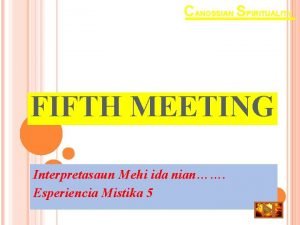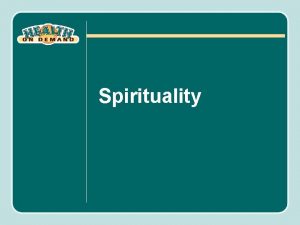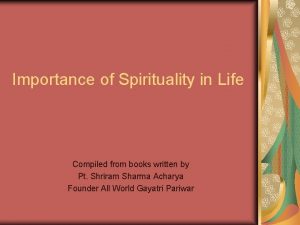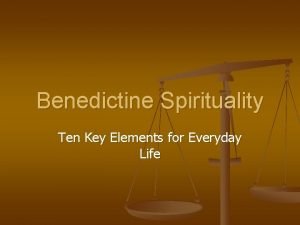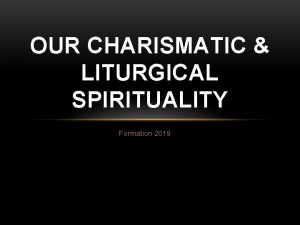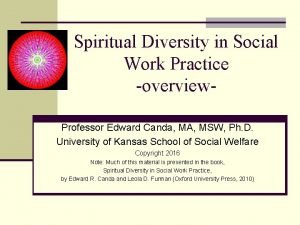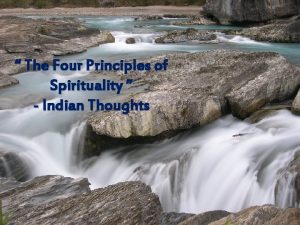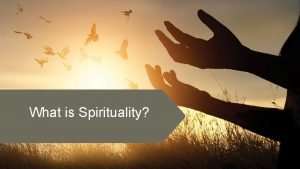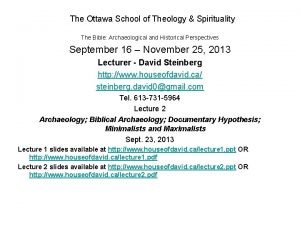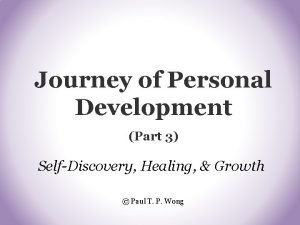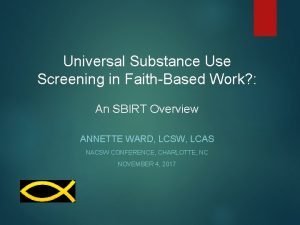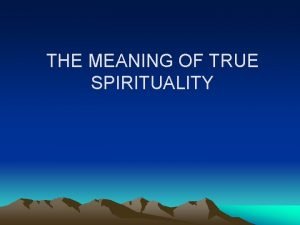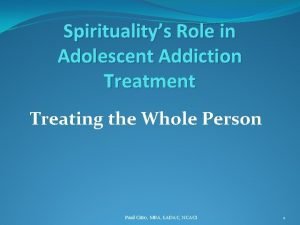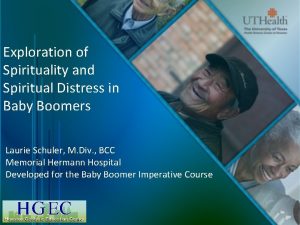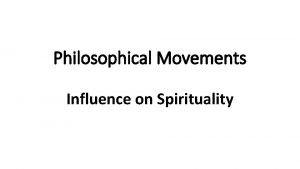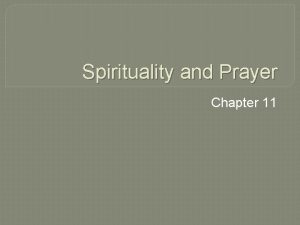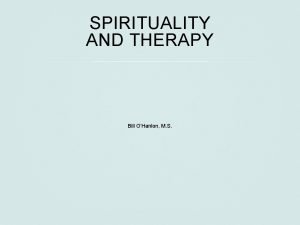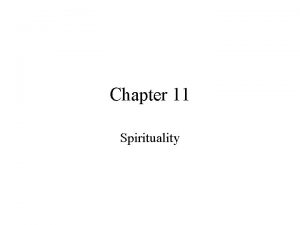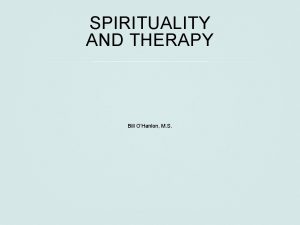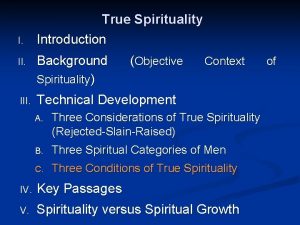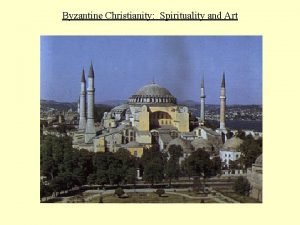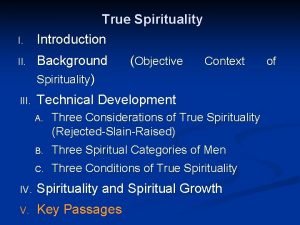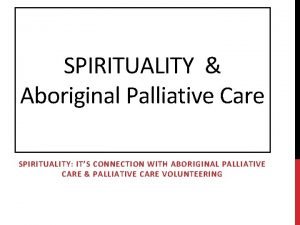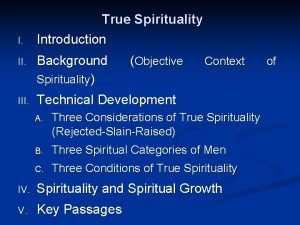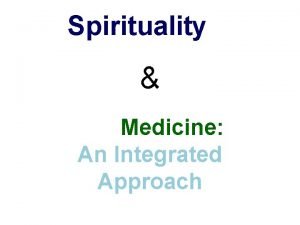Philosophical Movements Influence on Spirituality Philosophical Movements The





















- Slides: 21

Philosophical Movements Influence on Spirituality

Philosophical Movements • The word philosophy comes from two Greek words, philo which means “I love” and Sophia which means “wisdom”. • Hence, philosophy means lover/love of wisdom. • During the time of Jesus philosophical movements were widespread. • The Gospels don’t record any encounter between Jesus and any member of the philosophical movements. • Paul had an encounter with the Epicureans and Stoics. • Philosophy had an impact on early Christianity and Spirituality.

1. SOCRATES (469 -399 BC) • He was born in Athens, Greece. • His philosophical contribution was in the area of Ethics. • He never wrote anything. • All that is known about him was written by his students, especially Plato. • Basically, his philosophy was human centered. • He gave much attention to human beings while ignoring other phenomena.

• He focused on human behavior and the results of that behavior. • He taught that right behavior came from (gnosis) knowledge. • One has to know how she/he is expected to behave so that one can behave appropriately. • The more perfect our knowledge is, the more perfect our behavior becomes. • He taught that true knowledge gives birth to virtue.

Socratic Basic Virtues: 1. PROVIDENCE • The ability to provide not only for oneself but also for others. • One should not be selfish, thinking about oneself all the time. • Others should be accommodated. 2. COURAGE • True knowledge gives rise to courage. • Courage to protect others and to do heroic things despite the dangers one might encounter.

3. SELF-CONTROL • Life is full of temptations, and self-control is a discipline that is required. • Self-control is needed in the areas of food, sex, drink, anger, speeding, etc. 4. JUSTICE • True knowledge brings about justice. • Those with knowledge are prepared to fight for justice. • So, according to Socrates, knowledge gives rise to virtue. • A virtuous life leads to happiness.

Other Socratic Virtues • Listening, Patience, • Perseverance, Trusting one’s doubts, • Talking frankly, Postponing one’s judgment • Willingness to revise one’s opinion, • Respect for other point of view, etc.

ARISTOTLE (384 -322 BC) • He was a student of Plato. • Disagreed with his teacher about the existence of two worlds. • The physical world is a reality and there is no other world. • Everything that exists is substance. • There is no distinction between ideas and objects. • Of all the physical objects, there is one which is not made out of matter, and that is God. • God is immaterial.

• Aristotle explained the difference between matter and substance. • Matter is not substance until it is worked on, then it becomes substance. • So, substance is matter that has been acted upon. • If we want to attain knowledge, we can get it from this physical world because it is unquestionably real. • There is enough knowledge in matter, but it needs to be acted upon.

• According Aristotle, there is a force which he called Prime Force, which makes things happen. • Everything is in a state of motion, but for things to be in motion there should be a prime mover. • That prime mover has intelligence and purpose. • It is the beginning and end of that purpose. • He identified the prime mover with God. • Human beings are made of substance, and they are not gods.

Principal parts of a Human Being (a) Body (b) Soul (c) Divine Spark • The Divine Spark is eternal and impersonal, just like God. • The object of life is to seek happiness and well-being. • This can be achieved through walking the right path which he called the Golden Mean. • This means that, one must strike a balance between the pursuit of pleasure, desires, and the drives of the body, and spiritual life. • St. Paul is believed to have used Aristotle.

EPICUREANISM • It is associated with Epicurus (342 -270 BC). • He spent most of his life in Athens (Acts 17: 18 ff) where he taught. • Sensation/feeling/perception is the standard of all human truth. • If we want to know what is true, we can get reliable knowledge from our feelings. • The highest of human purpose is to achieve mental bliss/happiness/gratification/peace of mind.

• For Epicurus, the purpose of life was to attain happiness and tranquility, characterized by: 1. Ataraxia: peace and freedom from fear. 2. Aponia: the absence of pain. 3. Living a self-sufficient life, surrounded by friends. • Mental bliss is the most perfect state a human being can achieve. • Pleasure and pain are the measures of what is good and evil. • The pursuit of mental bliss can be disturbed by certain undesirable factors.

Three Fears That Prevents Achievement of MB. 1. Fear of Death • Death should never be feared. • Human beings are a mere composite of atoms, which go to make other things at death. • After the disintegration of these atoms, there is nothing else left to live forever. • Death is the end of both body and soul. • Death, is in fact, a long sleep, and heralds the end of all suffering and pain. • Death must be embraced because it is not evil.

2. The Fear of gods • Epicureans affirmed the existence of gods. • However, gods were not to be feared because they too were made out of atoms. • They did not create the world. • The gods’ atoms do not come apart. • Gods have no concern about the welfare of human beings. • The gods do not reward or punish humans because it is not their business to do that. • The universe is infinite and eternal, and it will never end.

3. Fear of Misfortune/Fate • Don’t worry about misfortune and fate because there is little you can do to avoid it. • We must try to minimize our experiences of pain and maximize our pleasurable experiences. • One has to withdraw from politics and public life where we are like to get hurt. • Concentrate on the pursuit of tranquility and pleasure. • The pain that we cannot escape must be endured. • Paul met these philosophers at Athens.

STOICISM • It was named after the painted stoa in Athens. • It was popularized by Zeno of Citium (334 -264). • The stoics had a great influence in Greece and the Roman Empire. • They taught that the world is materialistic and real. • Everything that is real must be physical, material, visible, and tangible.

• The body is made up of particles of different textures. • It has finer particles that penetrate coarser particles. • Between the particles there is tension/divine spirit. • The tension is a result of the vital warmth/ logos, which is the source of all reality. • The Vital Warmth gives harmony to all things. • The logos is intelligent, self-conscious, and indwelling reason. • Some gods are not real, but manifestations of the logos.

• The wise should gain control over passions. • Should face both good and bad with detachment. • We must not worry about what we cannot control, but what we can control. • There is only one logos, one reason, one wisdom, and consequently there should be unity in terms of law and conduct. • All people, by virtue of the divine spirit in them are equal. • It is by accident that people have different stations in life. • The object of life is not just to seek happiness, but total obedience to all the good that is inspired by gods.

POSITIVE EFFECTS • It gave rise to very good leaders who worked for human equality. • It led to the modification of the Roman law. • It helped make the treatment of slaves less oppressive. • It also led to the extension of the Roman citizenship to people who were not Romans.

NEGATIVE EFFECTS • The teaching that people were equal and occupied different stations in life by accident led to a life of resignation and laziness. • The general objective of Stoicism was not to seek God as we know him, but reason.
 Non locomotor or axial movements
Non locomotor or axial movements Canossian spirituality
Canossian spirituality Ways to improve spiritual wellness
Ways to improve spiritual wellness Spirituality importance
Spirituality importance Benedictine spirituality in everyday life
Benedictine spirituality in everyday life The problem of emotionally unhealthy spirituality
The problem of emotionally unhealthy spirituality Liturgical spirituality
Liturgical spirituality Mi'kmaq feather
Mi'kmaq feather Features of spirituality
Features of spirituality Four principles of spirituality
Four principles of spirituality Spirituality meaning
Spirituality meaning Spirituality religion
Spirituality religion Ottawa school of theology and spirituality
Ottawa school of theology and spirituality Religiosity vs spirituality
Religiosity vs spirituality The pure in heart bible verse
The pure in heart bible verse Reds motivational interviewing
Reds motivational interviewing Four pillars of franciscan spirituality
Four pillars of franciscan spirituality Spirituality meaning
Spirituality meaning 5 elements of salesian youth spirituality
5 elements of salesian youth spirituality Spirituality and addiction
Spirituality and addiction Spirituality definition
Spirituality definition 4 principles of indian spirituality
4 principles of indian spirituality

